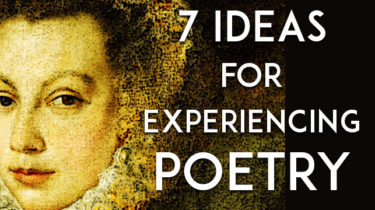7 Ideas For Experiencing Poetry

April is national poetry month, which means that teachers all over will feel obligated to dust off their ancient books of rhyme. But poetry doesn’t have to be full of archaic words and stuffy meter. With some engaging and innovative lessons, poetry can be fun and challenging and the best part of the year.
Here are 7 ideas to experience poetry this month.
Do some Madlibs. One of my favorite low-key ways to get students experiencing poetry from the inside out is to have them write poem imitations. I often make a very simple handout for them with words blanked out so that they can fill in their own. Other times, I give them a little more freedom to imitate as much or as little as they like. Students might take Langston Hughes’ classic poem “Let America Be America Again” and change it around to “Let Soccer Practice Be Practice Again.” Or they might take Anne Bradstreet’s ode to her husband, “To My Dear and Loving Husband” and write a fun, silly take on their own great love: “To My Tasty and Luscious Ice Cream.” When students imitate Williams Carlos Williams’ poem “This Is Just To Say,” as they will in this lesson, their resulting poems are always hilarious and insightful.
Watch some videos. Watching poets read and discuss their own poetry is a whole different experience, and for most students, probably not what they expect from a poetry unit. But when students listen to a poem explained in the poet’s own point of view, they see poetry as something immediate, important, and worth their time. Simply searching YouTube for your favorite contemporary poet will result in some great choices. This lesson on contemporary war poet Brian Turner is a hit with students and gets them to analyze and discuss the effects of watching a poet read their own work.
Write your own poetry that you share with the class. My poetry is mediocre at best, but I always make point to read it out loud to my classes. I want them to know that imperfect poetry is still lots of fun. My favorites are always haikus, but any of the suggested exercises in these lessons will inspire you to write your own verse. Letting kids know that it’s okay to experiment with poetry, and that no one writes perfect poems right off the bat, is a great way to encourage them to have fun and improve their skills.
Incorporate contemporary popular music. One of my favorite ways to challenge my students is to get them to question the messages that they are given from pop culture. Whether it’s the gender roles perpetuated in love music, or the potentially dangerous culture of “live fast, die young,” it’s important to get kids to think about what they are told and what they believe. Listening to their music choices is also a great way to find out their interests and to connect a little.
Discuss the big questions. It might seem counterintuitive, but for me, the classes that are the most fun are the ones when we really dig deep into the important questions. What is the best way to approach death and dying? What’s it like to leave home and never come back? What happens when our dreams come true, and what happens when they don’t? One reason why I love hanging out with teenagers is that they are still figuring things out, and getting them to discuss these big questions helps them to come one step closer to deciding their own views and beliefs.
Read some marginalized voices. Often, due to budget restrictions or conservative department choices, English teachers are stuck reading novels and plays that are considered to be part of “the canon” (read: dead white males). This can be tough for students who don’t recognize themselves or their experience in these mainstream texts. But when you incorporate poetry into your units, it’s a good opportunity to get some lesser known, marginalized writers. This lesson on exile, immigration, and homesickness is one of my favorites. It’s relatable for many students, and for others, it gives them some perspectives that they might not have considered.
Challenge your students and then ask them to do a little more. Students are often resistant to study poetry because they think it’s too hard or they won’t understand what’s going on. That challenge is half the fun for me. When they have read a Shakespeare sonnet and truly comprehended the effect of the extended metaphor, the self confidence that they gain is hard to beat. I make sure to start slow, giving them the scaffolding that they need, but then I push them a little and let them figure things out for themselves. Of course, I’m always around to give a little nudge or answer any questions.
Ready to get your classes experiencing poetry in new, innovative, and fun ways? All of the lessons above are included in my growing poetry bundle for a discount when you buy them together.
